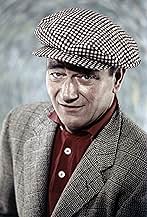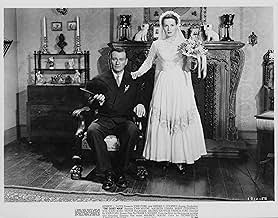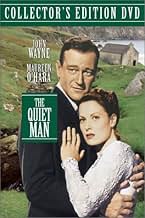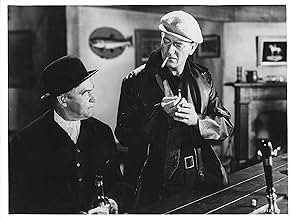A retired American boxer returns to the village of his birth in 1920s Ireland, where he falls for a spirited redhead whose brother is contemptuous of their union.A retired American boxer returns to the village of his birth in 1920s Ireland, where he falls for a spirited redhead whose brother is contemptuous of their union.A retired American boxer returns to the village of his birth in 1920s Ireland, where he falls for a spirited redhead whose brother is contemptuous of their union.
- Director
- Writers
- Stars
- Won 2 Oscars
- 15 wins & 10 nominations total
Charles B. Fitzsimons
- Hugh Forbes
- (as CHARLES fitzSIMONS)
James O'Hara
- Father Paul
- (as James Lilburn)
Sean McClory
- Owen Glynn
- (as Sean McGlory)
Jack MacGowran
- Ignatius Feeney
- (as Jack McGowran)
- Director
- Writers
- All cast & crew
- Production, box office & more at IMDbPro
Featured reviews
One of the best directed by John Ford. An emotional, humorous look at an American, played by John Wayne, going back to his native Ireland and trying to fit in with the present culture. Sensational scenery and the grand music by Victor Young support this classic among classics. Breezy and rowdy. Too beautiful to turn your back on. A great illustration of romance. The interaction between Wayne and Maureen O'Hara is magical and hard to beat.
Other classic performances are turned in by Victor McLaglen, Ward Bond and Barry Fitzgerald.
Other classic performances are turned in by Victor McLaglen, Ward Bond and Barry Fitzgerald.
10huttfam5
What's not to like about this picture? A classic directed by the legendary John Ford. John Wayne and Maureen O'Hara light up the screen. Wayne's performance is brilliant, but what really stands out is that he is playing a regular guy with real feelings and emotions--no army uniforms, no indians to fight, no cavalry coming to the rescue--just a great performance. The supporting cast is unmatched--including great performances by Victor McLaglen, Barry Fitzgerald and Ward Bond. Look closely for Ken Curtis (Festus, from Gunsmoke) in an uncredited role. The scenery is absolutly breathtaking--it makes me want to go home to Ireland--and I'm not even Irish. To top it off The Quiet Man has the greatest fist fight ever captured on film. This is one of my two favorite John Wayne movies. The Duke should have gotten an Oscar for this one. Movie viewers won't be disapointed by this one.
"The Quiet Man" is an Irish village version of "The Taming of the Shrew," the tamer being an ex-pugilist Sean Thornton (John Wayne) retired to the land of his fathers where he purchases "that little place across the brook, that humble cottage." But no sooner does he arrives on a soft spring morning than he falls in love with Mary Kate (Maureen O'Hara).
Sean courts and weds her easily enough, but he has not worked out on the anger of her heavy and hard rich brother, the farmer Will Danaher (Victor McLaglen) who holds an envy against him for having bought the very property that separates his spread from that of the wealthiest widow in Innisfree Sarah Tillane (Mildred Natwick) whom Danaher strongly desires...
Danaher refuses to supply the traditional dowry, and Mary Kate accuses Sean for his apparent cowardice in not fighting for what is rightfully theirs...
The battle that follows (considered to be the longest recorded on screen) has Sean and his strong brother-in-law engaging in a climatic fight the townsfolk have long been anticipating with effervescent...
Maureen O'Hara is totally in her element as the fiery Irish girl whether as the bare-footed attractive woman looking after a number of sheep in the meadow, or as the troubled colleen trying to explain her problem to the devoted salmon-catching Catholic priest (War Bond) or as the proud beauty whom Wayne lets fall at her brother's feet... Maureen would play Wayne's love interest in four more features ("Rio Grande," "The Wings of Eagle," "McLintock," and "Big Jake"). Their screen relationship emphasized the strength of their chemistry...
Barry Fitzerald is simply superb as Michaeleen Flynn, the village matchmaker and cart-driver who can't seem to tell anyone something without winning a black beer from them first...
With an exciting Innisfree Races along the beach, a titanic fight from the farm, across the hillside, through a haystack and into a stream, and with emerald environments and great music, John Ford's romantic comedy is a marvelous entertaining film, painted beautifully, simply told with love and humor...
With 7 Academy Award Nominations, the film earns Ford his 4th and last Oscar for Best Director establishing a record which is still unbeaten and won another Oscar for the outstanding Technicolor for Best Cinematography...
Sean courts and weds her easily enough, but he has not worked out on the anger of her heavy and hard rich brother, the farmer Will Danaher (Victor McLaglen) who holds an envy against him for having bought the very property that separates his spread from that of the wealthiest widow in Innisfree Sarah Tillane (Mildred Natwick) whom Danaher strongly desires...
Danaher refuses to supply the traditional dowry, and Mary Kate accuses Sean for his apparent cowardice in not fighting for what is rightfully theirs...
The battle that follows (considered to be the longest recorded on screen) has Sean and his strong brother-in-law engaging in a climatic fight the townsfolk have long been anticipating with effervescent...
Maureen O'Hara is totally in her element as the fiery Irish girl whether as the bare-footed attractive woman looking after a number of sheep in the meadow, or as the troubled colleen trying to explain her problem to the devoted salmon-catching Catholic priest (War Bond) or as the proud beauty whom Wayne lets fall at her brother's feet... Maureen would play Wayne's love interest in four more features ("Rio Grande," "The Wings of Eagle," "McLintock," and "Big Jake"). Their screen relationship emphasized the strength of their chemistry...
Barry Fitzerald is simply superb as Michaeleen Flynn, the village matchmaker and cart-driver who can't seem to tell anyone something without winning a black beer from them first...
With an exciting Innisfree Races along the beach, a titanic fight from the farm, across the hillside, through a haystack and into a stream, and with emerald environments and great music, John Ford's romantic comedy is a marvelous entertaining film, painted beautifully, simply told with love and humor...
With 7 Academy Award Nominations, the film earns Ford his 4th and last Oscar for Best Director establishing a record which is still unbeaten and won another Oscar for the outstanding Technicolor for Best Cinematography...
I like The Quiet Man so much that it features in my top three favourite films. This incidentally is alongside quite disparate films as Blade Runner and The Shawshank Redemption.
This is nothing to do with direction, acting or even location but simply because it feels so good!
Yes it is a simple story but it's amusing, very easy to watch and leaves you with a warm glow and a smile. Also the building of the "diddly diddly music" approaching the fight sequence is a delight.
That's all I need from a film that does not pretend to be anything more than a story.
This is nothing to do with direction, acting or even location but simply because it feels so good!
Yes it is a simple story but it's amusing, very easy to watch and leaves you with a warm glow and a smile. Also the building of the "diddly diddly music" approaching the fight sequence is a delight.
That's all I need from a film that does not pretend to be anything more than a story.
Maureen O'Hara in Technicolor is surely any Irishman's dream, and "The Quiet Man" would be timeless for that alone. But O'Hara's performance is all the more indelible for the great good humor she bestows on her character, Mary Kate Danaher. Let's face it; with any other actress, this could have been a disaster.
Sean Thornton (John Wayne) comes back to County Mayo, his birthplace, to find a peace he lost tragically back home in America. He immediately discovers some old friends, and a new one, too, Mary Kate, who while herding sheep stares back at him in what James Joyce might have called "a significant manner."
Director John Ford elects to shoot O'Hara from an odd angle, and with an unusual overhead shadow crossing O'Hara's face, that in anyone else's hands would have totally blown the shot but here creates something, well, "Homerific." It's one of many amazing shots in a film that seems more painted than photographed, and is perhaps the most strikingly lovely film ever made.
The shot of O'Hara looking back at Wayne also clues you onto something else, that this is going to be her story as much as it is Thornton's. In fact, it's really more about her than it is about him, a film about romance and a woman's liberation at the hands of her lover. We call them "chick flicks" today. But since John Wayne is the nominal star and no one ever confused Ford with Douglas Sirk, "The Quiet Man" isn't popularly regarded this way.
It's fun to read all the comments about poor Mary Kate and how this film glamorizes the mistreatment of women. They have one thing right, it's a film about spousal domination, but it's the wife ruling the husband. Think about it: She makes her lover do just about everything he does in the film, even risk bodily injury at the hands of her brutish brother (she doesn't know about his past and thinks she married "a coward.") People complain that he drags her across a dung-covered field, while a helpful woman hands him a stick "to beat the lovely lady with." But of course it's Mary Kate who's in total control of the situation. She wants Thornton to fight for her, in every sense of the word, and won't make it easy. She wants him to adapt to her culture, rather than adapt to his. (She's not one to be "honked at," as she puts it.) It's not surprising she trips and falls at one point while Thornton pulls her across a field; probably one of those puppet strings of hers got in the way.
But there are worse things in life than being enslaved by the likes of Maureen O'Hara, like not being enslaved by the likes of Maureen O'Hara. She's not only beautiful and pure-hearted, but such a hilarious joy to be around. O'Hara plays up the comedy of her scenes very well; she could have opted for a more regal distance from the slapstick but plays it as rowdy as the rest instead. The scene when she spits in her hand before shaking with matchmaker Michaleen Flynn (Barry Fitzgerald, who gives the next-best performance after O'Hara) tells you who she is better than any of her many sexy moments on screen. It also gets back to the point of why she's so essential in this film. She is Ireland, the spirit of Erin, and you want her to win, not because she's so pretty but because you know she's good and right for Sean, too.
About the only things wrong with the film are the action sequences, the horse race and the fistfight between Sean and Mary Kate's brother. It's not because the scenes aren't terrific, but because they are so abbreviated, especially the fistfight, which feels likes its building to something even funnier and more rousing than what's come before when it just sort of stops. Ford apparently had to do some cutting to get his film in at the required length, and with his focus as much on Mary Kate as possible, probably preferred to trim the scenes that had the least to do with her. But since the focus on O'Hara is what makes the film anyway, this is a small matter. Wayne fans wanting more action will just have to content themselves with almost every other film the Duke ever made.
Seeing this film for the first time reminded me a lot of "Local Hero," the 1982 comedy. Not only is "The Quiet Man" also a fish-out-of-water story about an American in the British Isles (Scotland in "Local Hero"), both films maintain a very delicate balancing act between whimsy and pathos, with "The Quiet Man," siding on the former direction and "Local Hero" the latter. Definitely worth checking out the one if you saw and liked the other. But "Quiet Man" was there first.
Sean Thornton (John Wayne) comes back to County Mayo, his birthplace, to find a peace he lost tragically back home in America. He immediately discovers some old friends, and a new one, too, Mary Kate, who while herding sheep stares back at him in what James Joyce might have called "a significant manner."
Director John Ford elects to shoot O'Hara from an odd angle, and with an unusual overhead shadow crossing O'Hara's face, that in anyone else's hands would have totally blown the shot but here creates something, well, "Homerific." It's one of many amazing shots in a film that seems more painted than photographed, and is perhaps the most strikingly lovely film ever made.
The shot of O'Hara looking back at Wayne also clues you onto something else, that this is going to be her story as much as it is Thornton's. In fact, it's really more about her than it is about him, a film about romance and a woman's liberation at the hands of her lover. We call them "chick flicks" today. But since John Wayne is the nominal star and no one ever confused Ford with Douglas Sirk, "The Quiet Man" isn't popularly regarded this way.
It's fun to read all the comments about poor Mary Kate and how this film glamorizes the mistreatment of women. They have one thing right, it's a film about spousal domination, but it's the wife ruling the husband. Think about it: She makes her lover do just about everything he does in the film, even risk bodily injury at the hands of her brutish brother (she doesn't know about his past and thinks she married "a coward.") People complain that he drags her across a dung-covered field, while a helpful woman hands him a stick "to beat the lovely lady with." But of course it's Mary Kate who's in total control of the situation. She wants Thornton to fight for her, in every sense of the word, and won't make it easy. She wants him to adapt to her culture, rather than adapt to his. (She's not one to be "honked at," as she puts it.) It's not surprising she trips and falls at one point while Thornton pulls her across a field; probably one of those puppet strings of hers got in the way.
But there are worse things in life than being enslaved by the likes of Maureen O'Hara, like not being enslaved by the likes of Maureen O'Hara. She's not only beautiful and pure-hearted, but such a hilarious joy to be around. O'Hara plays up the comedy of her scenes very well; she could have opted for a more regal distance from the slapstick but plays it as rowdy as the rest instead. The scene when she spits in her hand before shaking with matchmaker Michaleen Flynn (Barry Fitzgerald, who gives the next-best performance after O'Hara) tells you who she is better than any of her many sexy moments on screen. It also gets back to the point of why she's so essential in this film. She is Ireland, the spirit of Erin, and you want her to win, not because she's so pretty but because you know she's good and right for Sean, too.
About the only things wrong with the film are the action sequences, the horse race and the fistfight between Sean and Mary Kate's brother. It's not because the scenes aren't terrific, but because they are so abbreviated, especially the fistfight, which feels likes its building to something even funnier and more rousing than what's come before when it just sort of stops. Ford apparently had to do some cutting to get his film in at the required length, and with his focus as much on Mary Kate as possible, probably preferred to trim the scenes that had the least to do with her. But since the focus on O'Hara is what makes the film anyway, this is a small matter. Wayne fans wanting more action will just have to content themselves with almost every other film the Duke ever made.
Seeing this film for the first time reminded me a lot of "Local Hero," the 1982 comedy. Not only is "The Quiet Man" also a fish-out-of-water story about an American in the British Isles (Scotland in "Local Hero"), both films maintain a very delicate balancing act between whimsy and pathos, with "The Quiet Man," siding on the former direction and "Local Hero" the latter. Definitely worth checking out the one if you saw and liked the other. But "Quiet Man" was there first.
Did you know
- TriviaAt the film's conclusion, after the credits, we see Kate and Sean standing in their garden waving good-bye. Maureen O'Hara turns to John Wayne and whispers something in his ear, evoking a priceless reaction from Wayne. What was said was known only to O'Hara, Wayne and director John Ford. In exchange for saying this unscripted bit of text, O'Hara insisted that the exact line never be disclosed by any involved parties. In her memoirs she says that she refused to say the line at first as she "couldn't possibly say that to Duke", but Ford insisted, claiming he needed a genuine shock reaction from Wayne. The line remains a mystery to this day.
- GoofsBefore Sean enters Mary Kate's home to ask her brother's permission to court her, the flowers he's carrying are very sad looking. After he enters the house, they change into a nice, full, colorful bouquet.
- Quotes
Mary Kate Danaher: Could you use a little water in your whiskey?
Michaleen Flynn: When I drink whiskey, I drink whiskey; and when I drink water, I drink water.
- ConnectionsFeatured in Directed by John Ford (1971)
- SoundtracksThe Wild Colonial Boy
(uncredited)
Traditional
Adapted by Sean O'Casey and Dennis O'Casey
Performed by John Wayne, Ken Curtis, and Francis Ford and others in the Pub
Reprised a cappella by Wayne and Victor McLaglen
Details
- Release date
- Country of origin
- Languages
- Also known as
- El hombre quieto
- Filming locations
- Cong, County Mayo, Ireland(Inisfree)
- Production company
- See more company credits at IMDbPro
Box office
- Budget
- $1,750,000 (estimated)
- Runtime
- 2h 9m(129 min)
- Aspect ratio
- 1.37 : 1
Contribute to this page
Suggest an edit or add missing content






































